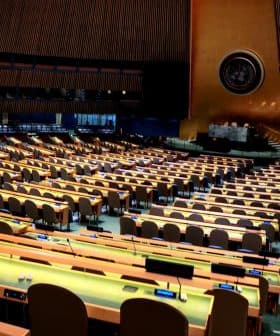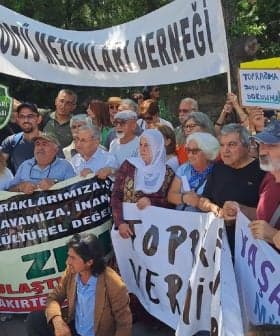Compensation for Climatically Vulnerable Countries Agreed at COP27
The 27th Conference of the Parties to the United Nations Framework Convention on Climate Change (COP27) in Sharm El-Sheikh, Egypt, reached an agreement to provide “loss and damage” funding for vulnerable countries impacted by climate disasters and reaffirmed commitments to limit global temperature rises to 1.5 ºC above pre-industrial levels. Delegates at COP27 pledged to work on defining crucial aspects of the loss and damage agreement, such as identifying which governments and institutions will pay and which countries and programs will receive funds, while also emphasizing the need for urgent action to transition to cleaner energy sources and reduce greenhouse gas emissions to limit temperature increases.
The 27th Conference of the Parties to the United Nations Framework Convention on Climate Change (COP27) concluded in Sharm El-Sheikh, Egypt, with an agreement to provide “loss and damage” funding for vulnerable countries severely impacted by climate disasters.
The agreement also reaffirmed commitments to limit global temperature rises to 1.5 ºC above the pre-industrial average, strengthen actions to reduce greenhouse gas emissions and adapt to the irreversible impacts of climate change.
We have determined a way forward on a decades-long conversation on funding for loss and damage.
“This outcome moves us forward,” said Simon Stiell, the U.N. Climate Change executive secretary. “We have determined a way forward on a decades-long conversation on funding for loss and damage, deliberating over how we address the impacts on communities whose lives and livelihoods have been ruined by the very worst impacts of climate change.”
The loss and damage compensation was the most controversial issue at COP27, with dozens of low-income and climatically vulnerable countries asking the developed countries that pumped the majority of anthropogenic greenhouse gases into the environment to take financial responsibility.
See Also:Multinational Food Producers Call for Swift Change in Agricultural PracticesCOP27 acknowledged the “devastating economic and non-economic losses” of climate change, such as “forced displacement and impacts on cultural heritage, human mobility and the lives and livelihoods of local communities.”
However, the agreement also said that loss and damage payments are not an admission of liability, preventing developed nations from being held accountable for future climate disasters.
From now until COP28, delegates from dozens of countries will work to define crucial aspects of the loss and damage agreement, such as which governments and institutions will have to pay and which countries and programs will receive the funds.
Observers at the conference pointed out how a decade after their promise to finance a $100 billion (€97.7 billion) climate change support fund for vulnerable nations, many richer countries have yet to make significant payments.
Still, many delegates from vulnerable countries expressed their satisfaction with the new loss and damage agreement.
Several European countries pledged $300 million (€293 million) in funding to help more vulnerable nations cope with the consequences of extreme weather events, which cause billions of dollars of damage each year.
The agreement also reiterated that climate change impacts need to be mitigated as much as possible. It stated that this would be more manageable should the temperature increase remain below 1.5 °C above pre-industrial levels.
The conference further agreed that a 2 °C increase should be avoided and resolved to pursue further efforts to limit the temperature increase to 1.5 °C as stipulated by the Paris Agreement.
The delegates acknowledged that the global community must eliminate 45 percent of greenhouse gas emissions by 2030 to reach this goal. However, atmospheric global emissions concentrations once again reached record highs in 2021.
Based on the current policies, temperatures are set to rise somewhere between 2.1 ºC and 2.9 ºC by the end of the century.
As they did at COP26 in Glasgow, delegates committed to gradually phasing down coal power and removing the subsidies for “inefficient fossil fuels.”
Opposition from the significant presence of oil and gas-producing countries in the Egyptian resort town meant there was no commitment to phase out the most polluting fossil fuels from the global energy system, which many climate activists had pushed to include.
See Also:Climate Change Continues to Threaten Global Health, Study Finds“Emissions peaking before 2025, as the science tells us is necessary. Not in this text,” said Alok Sharma, president of COP26. “Clear follow-through on the phase down of coal. Not in this text.”
The agreement also emphasized the need for urgent action to transition to cleaner energy sources. It encouraged wealthier countries to provide “targeted support to the poorest and most vulnerable, in line with national circumstances and to recognize the need for support towards a just transition.”
Delegates agreed that a global transition to cleaner energy would require between $4 to $6 trillion (€3.9 to €5.9 trillion) per year.
“Delivering this funding will require a swift and comprehensive transformation of the financial system and its structures and processes, engaging governments, central banks, commercial banks, institutional investors and other financial actors,” the U.N. said.
A separate agreement reached by G20 nations meeting in Indonesia pledged $20 billion (€19.5 billion) over the next half-decade to accelerate an equitable green transition.
The COP27 agreement also asked countries to “consider further actions to reduce 2030 non-carbon dioxide greenhouse gas emissions, including methane.”
Away from mitigation, the role of climate adaptation was also a central theme discussed at the conference, with different countries agreeing to continue down different paths. New pledges of up to $230 million (€225 million) came for an adaptation fund.
No definitive agreement was reached about financing the fund, but delegates agreed there should be at least $40 billion (€39 billion) per annum for the adaptation policies by 2050.
“These pledges will help many more vulnerable communities adapt to climate change through concrete adaptation solutions,” the U.N. said.
According to the final agreement, the new funding would constitute the backbone of a global effort that must also include technology transfer, renewable energy capacity expansion and require all countries to formulate and implement national adaptation plans.
Among the most relevant adaptation measures, the United Nations announced a $3.1 billion (€3 billion) plan to develop early warning systems against extreme weather events, to which a significant portion of the global population has no access.
The importance of conserving and restoring natural ecosystems was also agreed upon at COP27, with specific emphasis on reforestation and preserving marine environments to help capture carbon dioxide from the atmosphere. To this end, delegates agreed to set a goal of halting deforestation by 2030.
The next global conference on climate – COP28 – will take place in the United Arab Emirates in November 2023.









